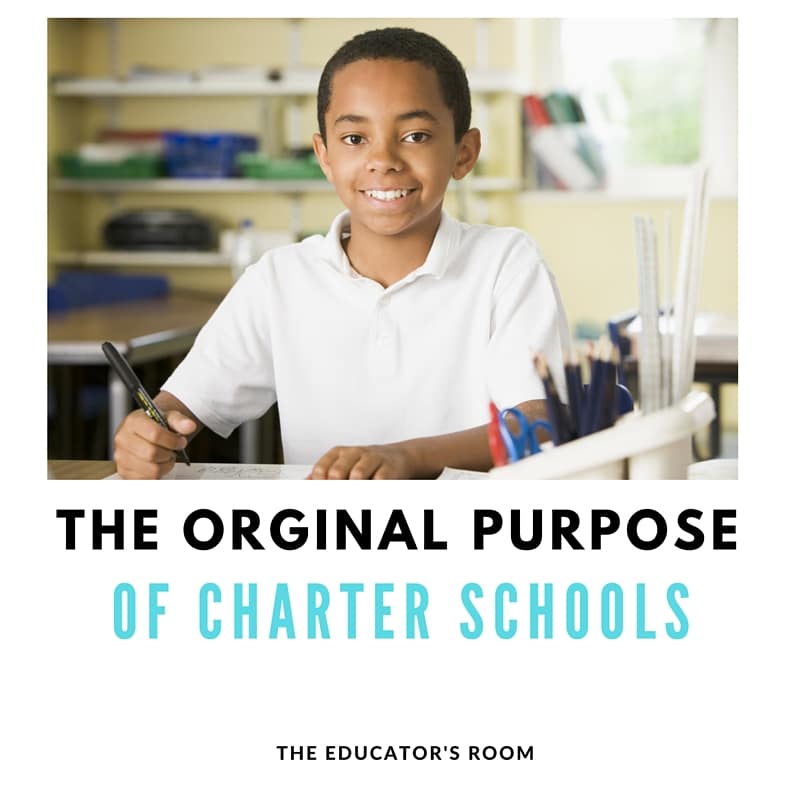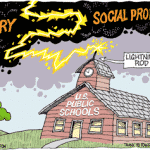For me, the core of the charter school issue lies in the difference between what charters were originally intended to be, and what they have become. The original model (and I can remember hearing about this when I was a teenager), was a student-centered, educator-designed and delivered, locally controlled endeavor. Consider the New York Times, looking back to the 80’s with 2014 perspective, on Al Shanker, president of the AFT from the 70’s to the 90’s and one of the original advocates for charter schools:
In a 1988 address, Mr. Shanker outlined an idea for a new kind of public school where teachers could experiment with fresh and innovative ways of reaching students. Mr. Shanker estimated that only one-fifth of American students were well served by traditional classrooms. In charter schools, teachers would be given the opportunity to draw upon their expertise to create high-performing educational laboratories from which the traditional public schools could learn.
Shanker’s concerns and his concepts for addressing them are echoed today in reform-speak: freedom, flexibility to devise strategies for meeting the needs of diverse students; sharing best practices as they’re discovered; building a community of learners…But The Times article continues:
Over time, however, charter schools morphed into a very different animal as conservatives, allied with some social-justice-minded liberals, began to promote charters as part of a more open marketplace…
Why did this happen? If today’s so-called reformers have and had similar concerns and goals, what’s the problem with the Shanker vision? Maybe it has something to do with this:
Mr. Shanker believed deeply that unions played a critical role in democratic societies and wanted charter schools to be unionized. But he also wanted to take democratic values to an even higher level: Students would see workplace democracy in action firsthand in charter schools because they would see teachers who were active participants in decision making. Likewise, students in economically and racially integrated schools would learn on a daily basis that we all deserve a seat at democracy’s table.
Unfortunately, for our communities, especially the most needy, a paradigm in which charters serve learners in a democratic fashion would not do for a market-driven government. So it became necessary for those looking to capitalize on the coming waves of education reform to forward their own narrative. In other words, if the charter idea is good, it was theirs and always was. If they do it in their “new-concept” schools-it’s okay. But if it involves local control, oversight, dedicated career educators, or God forbid…unions (*gasp!*), or if it is done in a traditional school: it is failing; bad or at least not good enough.
As a result, the “free market”, despite the vanishing promises held, became the new golden calf of education reform. Words like “competition” and “innovation” became the driving forces. Even our “hope and change” president was speaking on the importance of “winning the future” and American children being competitive in the global economy with children from India and China-two nations I had never been made to feel warm and fuzzy about in terms of the conditions for children.
But selling to the public that the global economy or free market really cares is a tough row to hoe- especially for those who benefit the most on the backs of those benefiting the least. There’s just too much-accumulating evidence over too much time to substantiate free market trust. So instead, the effort has gradually turned towards undermining traditional schools. The teaching profession and unions became implicitly scapegoated for failures in our socio-economic conditions and privately operated charters began to be empowered at the expense of the democratically run schools. The original concept of charter purpose was pushed aside. Consider the Education Next take on charters and where the idea came from:
But even though it is fashionable enough to credit Shanker for jump-starting the charter movement that even the Wall Street Journal is joining in, there is only a glimmer of truth to that urban legend. In actuality, Shanker did more to block charters than to advance the idea… as they worked on the legislation that was eventually passed in 1991, Nathan and Kolderie fundamentally altered the charter concept. According to the Budde model, charters were to be authorized by school districts and run by teachers. Central office administrators were to be pushed aside, but charter schools would still operate within collective bargaining arrangements negotiated between districts and unions. Nathan and Kolderie instead proposed that schools be authorized by statewide agencies that were separate and apart from local district control. That opened charter doors not only to teachers but also to outside entrepreneurs. Competition between charters and districts.
Such willingness to be patronizing and dismissive of grass-roots democracy and the institutions that promote it. Such worship of divisive and exploitative market forces. I never wanted or want to be a politician, but this thinly veiled propaganda is why I pay attention. I have met with legislators, spoken with NYSED associates, been in contact with SED regents. I have been at conferences and on conference calls with union leaders. I am currently our union president. I so wish I could set all that crap aside and just be a teacher. Even more than that, a husband and a father with little concern for what education will hold for my girls because I see no threat. But what I read, see and hear has made me afraid that without accountability for those who have truly gone unaccountable-even rewarded for their misdeeds: we are in danger of allowing the pigeons to drive the bus. Not only are my kids on that bus, but so are everyone else’s, and so are my colleagues. It is frustrating and demands an occasional mental and emotional break.
So, down off the soapbox because my head is spinning with the history and the truth, but my heart is filled with pride.
Just this past Wednesday, I was blessed to be present at a Board of Education meeting for the school my daughters attend and the one I work for. This meeting was especially nice because two of my daughters were recognized: the oldest because she has won recognition in this year’s Scholastic Awards-both at the regional (11 North Eastern states) with 4 awards (gold, silver, and two honorable mentions), and the national level: 1 silver. She read an excerpt from the national award winner to the board and many of her past and present teachers who were there. She has a learning disability that has been addressed with an IEP and through some adjustment of her coursework. She has a very high I.Q., but her incredible gifts with words and with art come accompanied by weird quirky challenges with math, foreign languages, attention to technical tasks. The other daughter, only 10, had helped organize a charity drive for the local SPCA along with some classmates who had started a club. When I say organize-I mean it. Without anyone knowing, press had been contacted by one of the cute little ringleaders, a local radio station had announced it, and the adults had to play catch up to be prepared for delivery of supplies, money and whatnot. I had some pictures and was describing the impressive initiative of these students (with them standing next to me), when my daughter sidled up and said quietly:
“Dad, can you stop now, I want to talk.”
Ten years old. While we were seated earlier, she had quickly prepared a script. Those girls spoke, answered questions, and made a huge impression. My pride isn’t just for my girls, or those girls-it’s for what things are allowed to happen when you empower learners, educators, schools and communities. These things are proof of what can happen if you call out the pigeons and keep them from being given the wheel. Reform should be about joining communities, learners, parents & professionals to demand policymaker support- not about empowering free market agents to erode and tear apart zip codes. Charters should free learners, families and communities to re-purpose education to serve them as citizens and citizens-to-be, not a tool for exploiting or subjugating citizens to be ranked and filed.







Leave a comment